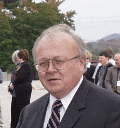Five noted experts in the federated search are serving as volunteer judges for our second annual contest. In the next few weeks they will have selected the winners.
Here are the bios of the judges.
 Abe Lederman has 25 years of experience in computer software engineering. He began his career with Hewlett Packard and was then recruited to become a founding member of Verity, a startup pioneer in the field of search engine technology. In 1994, Abe left Verity and later founded Innovative Web Applications (IWA), a software consulting firm primarily serving Los Alamos National Laboratory (LANL). While consulting with LANL and the U.S. Department of Energy’s Office of Scientific and Technical Information (OSTI), Abe came to realize the enormous potential for federated search technology to accelerate the diffusion of knowledge. He founded Deep Web Technologies in 2002. Abe holds Bachelor of Science and Master of Science degrees in Computer Science from the Massachusetts Institute of Technology.
Abe Lederman has 25 years of experience in computer software engineering. He began his career with Hewlett Packard and was then recruited to become a founding member of Verity, a startup pioneer in the field of search engine technology. In 1994, Abe left Verity and later founded Innovative Web Applications (IWA), a software consulting firm primarily serving Los Alamos National Laboratory (LANL). While consulting with LANL and the U.S. Department of Energy’s Office of Scientific and Technical Information (OSTI), Abe came to realize the enormous potential for federated search technology to accelerate the diffusion of knowledge. He founded Deep Web Technologies in 2002. Abe holds Bachelor of Science and Master of Science degrees in Computer Science from the Massachusetts Institute of Technology.
 Todd Miller Todd Miller is President and Founder of gwabbit, maker of the award-winning series of gwabbit semantic contact capture and management products. Declared a “Head-slappingly simple solution to a grating problem” by BusinessWeek, gwabbit has won numerous industry awards, including Inc Magazine’s list of “Top Smartphone Apps for 2009,” as well as winner of the 2010 CES Mobile Apps Showdown, and a DEMOgod award — the highest honor bestowed by the nation’s premier technology conference for launching startup companies.
Todd Miller Todd Miller is President and Founder of gwabbit, maker of the award-winning series of gwabbit semantic contact capture and management products. Declared a “Head-slappingly simple solution to a grating problem” by BusinessWeek, gwabbit has won numerous industry awards, including Inc Magazine’s list of “Top Smartphone Apps for 2009,” as well as winner of the 2010 CES Mobile Apps Showdown, and a DEMOgod award — the highest honor bestowed by the nation’s premier technology conference for launching startup companies.
Prior to launching gwabbit, Todd founded the federated search company, WebFeat, which was sold to ProQuest in February 2008. WebFeat was used by thousands of libraries and information centers worldwide. Todd was also president of Knight Ridder Information’s SourceOne subsidiary and also worked at Ziff Davis’ Information Access Company subsidiary, where he developed and managed the highly successful InfoTrac product line.
Miller holds four patents in the field of search technology and authentication and session management. He has received awards from the Gartner Group, Reed Publishing, The DEMO Conference, and others. Miller has been a featured speaker on IBM’s eBusiness Tour and was featured in IBM’s “Success Stories” campaign. In his abundant spare time, Miller is a competitive horseback rider. He resides in Carmel Valley, CA with his wife and their rescue dogs, horses, and other quadrupeds.
 Helen Mitchell has enjoyed working in the Enterprise Search arena for 20+ years. She currently has 2 main roles - 1) As Principal for Team Technology, Inc. leading an Enterprise Search Requirements project for the FDA as well as a search implementation for FDIC and 2) As Principal of her own IT Consulting Firm, Enterprising Solutions. Helen works closely with public and private sector clients to develop search strategies and solutions across disparate data sources and the deep web. She’s conducted Federated Search Webinars and will present 2 Continuing Education Federated Search courses at the Special Library Association’s Annual Conference. Being vendor neutral, she utilizes the ‘best’ technologies for clients to reduce costs, improve quality and efficiency, reduce ‘pain points’ and achieve a positive search experience. She retired from FDA in 2008 after 32 years of service where she led one of the largest enterprise search implementations among Civilian Federal Agencies. She facilitated integration of more than 20 million documents and applications into this system utilizing federated search connectors to improve their content findability. Helen is a frequent speaker at conferences and seminars on search technologies.
Helen Mitchell has enjoyed working in the Enterprise Search arena for 20+ years. She currently has 2 main roles - 1) As Principal for Team Technology, Inc. leading an Enterprise Search Requirements project for the FDA as well as a search implementation for FDIC and 2) As Principal of her own IT Consulting Firm, Enterprising Solutions. Helen works closely with public and private sector clients to develop search strategies and solutions across disparate data sources and the deep web. She’s conducted Federated Search Webinars and will present 2 Continuing Education Federated Search courses at the Special Library Association’s Annual Conference. Being vendor neutral, she utilizes the ‘best’ technologies for clients to reduce costs, improve quality and efficiency, reduce ‘pain points’ and achieve a positive search experience. She retired from FDA in 2008 after 32 years of service where she led one of the largest enterprise search implementations among Civilian Federal Agencies. She facilitated integration of more than 20 million documents and applications into this system utilizing federated search connectors to improve their content findability. Helen is a frequent speaker at conferences and seminars on search technologies.
 Richard Tong is the Founder and President of Tarragon Consulting Corporation. Tarragon develops custom solutions to the critical knowledge management and content analysis problems faced by Government and Industry. Tarragon uses its in-depth business and technical expertise to support organizations in the creation of high-value applications for customers, suppliers, and employees.
Richard Tong is the Founder and President of Tarragon Consulting Corporation. Tarragon develops custom solutions to the critical knowledge management and content analysis problems faced by Government and Industry. Tarragon uses its in-depth business and technical expertise to support organizations in the creation of high-value applications for customers, suppliers, and employees.
Prior to starting Tarragon, Dr. Tong co-founded, and was CTO at, Sageware, Inc.. Prior to Sageware, Dr. Tong was Director of Advanced Technology at Verity, Inc.
Dr. Tong has over twenty-five years experience in the design and deployment of advanced information systems for Government and Industry. He has extensive consulting experience with Booz Allen Hamilton and with Advanced Decision Systems, where he directed the R&D team that created the information retrieval capability that led to the forming of Verity.
Dr. Tong received his Ph.D. from the University of Cambridge, England, and was a NATO Research Fellow at the University of California, Berkeley.
Dr. Tong serves as a technical advisor to a number of companies, and provides expert technical assessments to support investment and M&A decisions. Dr. Tong has published extensively and is currently a member of the TREC Program Committee.
 Dr. Walt Warnick is Director of the U.S. Department of Energy Office of Scientific and Technical Information (OSTI); he directs the agency’s scientific and technical information operations. Dr. Warnick embraces the opportunities offered by the web to accelerate the spread of knowledge about science and technology. To this end, he has championed aggressive efforts to capitalize on technological advances to develop and provide state-of-the art products and services for sharing knowledge. Dr. Warnick and his colleagues continuously work to further advance web search technology.
Dr. Walt Warnick is Director of the U.S. Department of Energy Office of Scientific and Technical Information (OSTI); he directs the agency’s scientific and technical information operations. Dr. Warnick embraces the opportunities offered by the web to accelerate the spread of knowledge about science and technology. To this end, he has championed aggressive efforts to capitalize on technological advances to develop and provide state-of-the art products and services for sharing knowledge. Dr. Warnick and his colleagues continuously work to further advance web search technology.
Dr. Warnick was elected Fellow of the American Association for the Advancement of Science (AAAS) in 2005 “for leadership in the federal scientific information community and for contributions to the conceptualization, development and implementation of innovative programs that significantly advance access to government information.” He earned his Ph.D. and M.S. in Mechanical Engineering from the University of Maryland and his Bachelor of Engineering Science from The Johns Hopkins University.
 Abe Lederman has 25 years of experience in computer software engineering. He began his career with Hewlett Packard and was then recruited to become a founding member of Verity, a startup pioneer in the field of search engine technology. In 1994, Abe left Verity and later founded Innovative Web Applications (IWA), a software consulting firm primarily serving Los Alamos National Laboratory (LANL). While consulting with LANL and the U.S. Department of Energy’s Office of Scientific and Technical Information (OSTI), Abe came to realize the enormous potential for federated search technology to accelerate the diffusion of knowledge. He founded Deep Web Technologies in 2002. Abe holds Bachelor of Science and Master of Science degrees in Computer Science from the Massachusetts Institute of Technology.
Abe Lederman has 25 years of experience in computer software engineering. He began his career with Hewlett Packard and was then recruited to become a founding member of Verity, a startup pioneer in the field of search engine technology. In 1994, Abe left Verity and later founded Innovative Web Applications (IWA), a software consulting firm primarily serving Los Alamos National Laboratory (LANL). While consulting with LANL and the U.S. Department of Energy’s Office of Scientific and Technical Information (OSTI), Abe came to realize the enormous potential for federated search technology to accelerate the diffusion of knowledge. He founded Deep Web Technologies in 2002. Abe holds Bachelor of Science and Master of Science degrees in Computer Science from the Massachusetts Institute of Technology. Todd Miller Todd Miller is President and Founder of gwabbit, maker of the award-winning series of gwabbit semantic contact capture and management products. Declared a “Head-slappingly simple solution to a grating problem” by BusinessWeek, gwabbit has won numerous industry awards, including Inc Magazine’s list of “Top Smartphone Apps for 2009,” as well as winner of the 2010 CES Mobile Apps Showdown, and a DEMOgod award — the highest honor bestowed by the nation’s premier technology conference for launching startup companies.
Todd Miller Todd Miller is President and Founder of gwabbit, maker of the award-winning series of gwabbit semantic contact capture and management products. Declared a “Head-slappingly simple solution to a grating problem” by BusinessWeek, gwabbit has won numerous industry awards, including Inc Magazine’s list of “Top Smartphone Apps for 2009,” as well as winner of the 2010 CES Mobile Apps Showdown, and a DEMOgod award — the highest honor bestowed by the nation’s premier technology conference for launching startup companies.  Helen Mitchell has enjoyed working in the Enterprise Search arena for 20+ years. She currently has 2 main roles - 1) As Principal for Team Technology, Inc. leading an Enterprise Search Requirements project for the FDA as well as a search implementation for FDIC and 2) As Principal of her own IT Consulting Firm, Enterprising Solutions. Helen works closely with public and private sector clients to develop search strategies and solutions across disparate data sources and the deep web. She’s conducted Federated Search Webinars and will present 2 Continuing Education Federated Search courses at the Special Library Association’s Annual Conference. Being vendor neutral, she utilizes the ‘best’ technologies for clients to reduce costs, improve quality and efficiency, reduce ‘pain points’ and achieve a positive search experience. She retired from FDA in 2008 after 32 years of service where she led one of the largest enterprise search implementations among Civilian Federal Agencies. She facilitated integration of more than 20 million documents and applications into this system utilizing federated search connectors to improve their content findability. Helen is a frequent speaker at conferences and seminars on search technologies.
Helen Mitchell has enjoyed working in the Enterprise Search arena for 20+ years. She currently has 2 main roles - 1) As Principal for Team Technology, Inc. leading an Enterprise Search Requirements project for the FDA as well as a search implementation for FDIC and 2) As Principal of her own IT Consulting Firm, Enterprising Solutions. Helen works closely with public and private sector clients to develop search strategies and solutions across disparate data sources and the deep web. She’s conducted Federated Search Webinars and will present 2 Continuing Education Federated Search courses at the Special Library Association’s Annual Conference. Being vendor neutral, she utilizes the ‘best’ technologies for clients to reduce costs, improve quality and efficiency, reduce ‘pain points’ and achieve a positive search experience. She retired from FDA in 2008 after 32 years of service where she led one of the largest enterprise search implementations among Civilian Federal Agencies. She facilitated integration of more than 20 million documents and applications into this system utilizing federated search connectors to improve their content findability. Helen is a frequent speaker at conferences and seminars on search technologies. Richard Tong is the Founder and President of Tarragon Consulting Corporation. Tarragon develops custom solutions to the critical knowledge management and content analysis problems faced by Government and Industry. Tarragon uses its in-depth business and technical expertise to support organizations in the creation of high-value applications for customers, suppliers, and employees.
Richard Tong is the Founder and President of Tarragon Consulting Corporation. Tarragon develops custom solutions to the critical knowledge management and content analysis problems faced by Government and Industry. Tarragon uses its in-depth business and technical expertise to support organizations in the creation of high-value applications for customers, suppliers, and employees. Dr. Walt Warnick is Director of the U.S. Department of Energy Office of Scientific and Technical Information (OSTI); he directs the agency’s scientific and technical information operations. Dr. Warnick embraces the opportunities offered by the web to accelerate the spread of knowledge about science and technology. To this end, he has championed aggressive efforts to capitalize on technological advances to develop and provide state-of-the art products and services for sharing knowledge. Dr. Warnick and his colleagues continuously work to further advance web search technology.
Dr. Walt Warnick is Director of the U.S. Department of Energy Office of Scientific and Technical Information (OSTI); he directs the agency’s scientific and technical information operations. Dr. Warnick embraces the opportunities offered by the web to accelerate the spread of knowledge about science and technology. To this end, he has championed aggressive efforts to capitalize on technological advances to develop and provide state-of-the art products and services for sharing knowledge. Dr. Warnick and his colleagues continuously work to further advance web search technology. 
